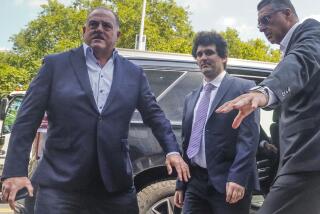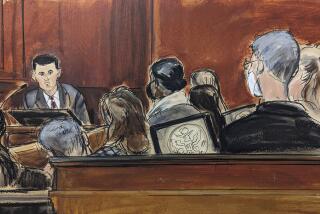Defense Begins Attack on Key Whitewater Trial Witness
- Share via
LITTLE ROCK, Ark. — A federal court jury in the Whitewater trial of two Arkansas bankers was told Friday that the government’s star witness was prepared to tell prosecutors whatever they wanted to hear.
The defense testimony was aimed at discrediting Neal T. Ainley, the former president of Perry County Bank who testified earlier against presidential aide Bruce Lindsey and bank owners Herby Branscum Jr. and Robert M. Hill. Lindsey is an unindicted co-conspirator.
Cooperating with independent counsel Kenneth W. Starr in a plea agreement, Ainley contended that the defendants and Lindsey schemed to illegally hide cash withdrawals by President Clinton’s 1990 gubernatorial campaign. Lindsey was the campaign treasurer.
Gary Butler, a carpenter from Perryville, Ark., testified that after Ainley pleaded guilty to two misdemeanors, the former bank president told him: “When the big boys get hold of you, you’ll tell them anything they want to hear.”
Billy Fox Jones, a Bigelow, Ark., carpenter who works with Butler, said he heard Ainley comment in a different conversation: “When the big man gets you, you’re just about willing to do anything to save yourself.”
A third witness, Bobby L. Hammons, told the jury that Ainley used to mock Branscum, even while still president of the defendants’ Perry County Bank.
Hammons, who worked at a convenience store owned by Ainley and a business partner, said Ainley used to refer to the short, stocky Branscum as the “fat penguin” and “Boss Hog,” a character from the old television show “Dukes of Hazzard.”
Under cross-examination by chief prosecutor W. Hickman Ewing, Hammons acknowledged that he was fired from the convenience store by Ainley.
Earlier, a former regulator testified that Branscum and Hill provided legitimate documentation for expense checks they received from the bank.
Pat McElroy Jr., a bank consultant and former examiner for the Federal Reserve Bank in Dallas, told the jury that the defendants’ vouchers for miscellaneous expenses were proper. The only issue, he said, is whether the defendants did outside work for their bank to justify the expenses, as they contended.
The testimony came a day after Clinton, on videotape, testified for the defendants.
An 11-count indictment charges that Branscum and Hill misapplied bank funds and conspired to use their bank’s money to reimburse themselves, friends and family members for political contributions.
Some of their donations went to Clinton’s 1990 gubernatorial campaign and his 1991 presidential exploratory committee.
The bankers also are accused of concealing $52,500 in cash withdrawals by Clinton’s campaign in May and November 1990, violating a requirement that banks report cash deposits and withdrawals of more than $10,000 to the Internal Revenue Service.
Branscum, an attorney, and Hill, an accountant, contended that they did outside professional work for the Perryville, Ark., bank and were reimbursed for these legitimate expenses. They said regulators never questioned their work for the bank they owned.
“There was legitimate documentation,” McElroy said. “The only issue to be decided is whether they did the work or not. I don’t see any theft.”
“Do you think if we paid you more than $30,000 you would see any theft?” prosecutor Jackie Bennett asked, referring to the fee that McElroy said he was earning from the defendants.
“No matter how much you pay me, I’m going to tell the truth,” the consultant said.
Prosecutors, working for Starr, have introduced records showing that while the bank owners provided documentation for some expenses, they didn’t do so for others.
According to the prosecution, vouchers for miscellaneous expenses were part of a political reimbursement conspiracy. Documents show that when these expense checks were issued, Branscum and Hill made out separate checks to relatives and others, who in turn made political contributions.
A number of the donations were made after Branscum and Hill had reached their contribution limits. The defendants said it was a coincidence that the expense checks and the contributions came at the same time. Witnesses have testified that it was common practice in Arkansas to give money to family members and others to make political contributions.
More to Read
Sign up for Essential California
The most important California stories and recommendations in your inbox every morning.
You may occasionally receive promotional content from the Los Angeles Times.













